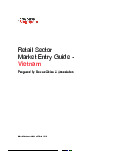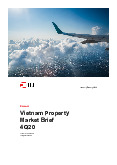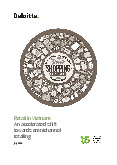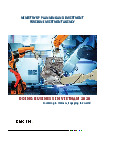



















Preview text:
ForMomandDad CONTENTS Author’s Note
Introduction: The Great Leapfrog Forward
1 The Right Person: @ the Right Place @ the Right Time 2 Boom! 3 Bust 4 The Foreign Experts 5 Alibaba’s Cave 6 Around the World with Jack 7 Alibaba’s Falling Carpet 8 Back to China 9 Last Man Standing 10 Lock Up 11 War on eBay 12 The Google Guys 13 Crocodile in the Yangtze 14 The eBay-Alibaba Hotline 15 Yahoo!
16 The Deal Heard ’Round the World 17 The China Search Wars
18 Free Is Not a Business Model 19 AliMania 20 Leaving Alibaba 21 Winter 22 Spring 23 Alibaba’s World
24 Alibaba and the Forty Lessons Notes Index AUTHOR’S NOTE
MY GOAL WITH Alibaba’s World is both to educate and inspire. I hope that entrepreneurs
and others chasing a dream can read the book to learn from Alibaba’s successes and mistakes.
And I hope that others can learn from Alibaba’s story to better understand what it was like on
the ground during a transformative time when the Internet brought China face-to-face with
the West. In pursuit of this goal I’ve made every effort to present an accurate and authentic reflection of my experiences.
Fortunately much of Alibaba’s history was captured in the 200 hours of video archives that I
gathered in preparing my documentary, Crocodile in the Yangtze. This, and detailed notes I
took during my time at Alibaba, provided a valuable reference for this book.
All the dialogue is based on actual conversations, but at times I combine two separate
conversations with one person into one conversation. The same is true of some of Jack Ma’s
early speeches where I have sometimes combined public comments he made separately at the
time into one speech. I also paraphrase Jack Ma’s English occasionally to account for the fact
that it is not his native language and sometimes includes small grammatical errors. In all
cases I have made every effort to preserve the accuracy and authenticity of what was said by all parties.
In a few instances, when discussing confrontations or conflicts with former colleagues, I
have left some minor characters unnamed. In a fast-growing start-up, there are always bumps
and bruises, internal disagreements. However, my goal here is to use issues or conflicts as
illustrations from which others may learn, not settle scores with individual colleagues. In the
spirit of fairness, I also do my best to point out the times when I myself made mistakes or held the wrong assumptions.
This book was written independent of Alibaba, with no involvement by the company.
Whether readers agree or disagree with my take on events, the opinions are entirely my own.
It’s my hope that sharing the story, in the most candid way possible, of how a schoolteacher
rose from obscurity to build the world’s largest e-commerce company can serve as a great
case study for students, entrepreneurs, and anyone else setting out on a journey of their own. INTRODUCTION THE GREAT LEAPFROG FORWARD
NOVEMBER 7, 2006, was the day I realized that Alibaba had finally arrived. As I stood at the
back of a packed auditorium at the Web 2.0 conference in San Francisco, my boss, Jack Ma,
took the stage. With a typically entertaining speech he captivated the high-level audience, a
who’s who of the Internet world.
“I’m 100 percent ‘made in China.’ I learned English myself, and I know nothing about
technology,” Jack explained. “One of the reasons why Alibaba survived is because I know
nothing about computers. I’m like a blind man riding on the back of a blind tiger.”
As the audience laughed, I noticed someone crouched down in the back of the auditorium,
scribbling down every word Jack said. Curious, I leaned over to see who was so intent on
transcribing Jack’s speech. I was shocked to find it was Jeff Bezos, the founder and CEO of Amazon.
Bezos—the father of e-commerce—eager to learn from Alibaba? This was the man who had
pioneered e-commerce and grown Amazon.com into an Internet behemoth. This was the
entrepreneur named Time magazine’s Person of the Year back in 1999 when Alibaba was still
an obscure start-up in Jack Ma’s apartment. Bezos was a business leader we had always
looked up to and admired—not to mention borrowed ideas from. And now he was borrowing ours!
Jeff continued taking notes as Jack spoke to the rapt group.
“Believe in your dreams, find good people, and make sure the customer is happy. I see a lot
of US companies sending professional managers to China. They are making their boss in the
US happy but not the Chinese customer.”
Jack had always wanted to meet Jeff Bezos, so I leaned over, introduced myself, and gave Jeff
my card. Jeff said he’d love to meet Jack as well. After Jack’s speech the two of us met with
Jeff in the convention center lobby. With his trademark laugh and infectious enthusiasm, Jeff
commended Jack on his speech: “You made some great points up there, Jack! I’d love for you
to visit us in Seattle someday.” As Jeff walked away, Jack and I beamed like two starstruck
groupies in a garage band who’d just been validated by their favorite rock star.
Seven months later I picked up the Wall Street Journal to find an interview with Jeff, who
was announcing an expansion in China. He described how he was determined to avoid the
problems other foreign Internet companies had encountered in China, explaining that the
reason they struggled was “because the Chinese management team is busy trying to keep
their American bosses happy, instead of trying to keep their Chinese customers happy. And
that’s a mistake we will not make.” Yes—it seemed Jeff had learned something from Jack.
Little did Jack and I know that in just a few years, Alibaba’s sales volume would surpass
those of both our idols—Amazon and eBay. Combined. Not just in China. Everywhere.
When Alibaba got started in Jack Ma’s apartment, it seemed far-fetched to think that
Western Internet companies would someday be learning from China’s e-commerce founders.
With only two million Internet users in China, less than 1 percent of the country’s population
was online. And of that 1 percent, even fewer would consider purchasing something online.
The barriers were simply too great. Consumer purchasing power was too low. Credit card
penetration was negligible. Logistics infrastructure was primitive. It was unclear whether the
government would embrace or reject the Internet. And e-commerce seemed impossible in the
context of China’s Wild West capitalism, where scammers were all too common and where
buyers and sellers who had never met in person simply didn’t trust each other enough to do transactions online.
Fast-forward 15 years, and the difference in the numbers is astounding. Alibaba now has
approximately 300 million customers and executes about 80 percent of China’s e-commerce
transactions. More than half of all packages shipped in China are from deals that originated
on Alibaba’s websites. And during its 2014 Singles’ Day promotion—a shopping holiday that
Alibaba invented—Alibaba’s consumer shopping websites handled $9.3 billion in transactions
on just one day—more than the total US online sales on Black Friday and Cyber Monday
combined. All this in a country where the per capita income is just $6,800 per year and only
about 25 percent of the population has ever shopped online. Compared to the United States,
China’s e-commerce boom is just beginning.
Alibaba’s experience has shown that, although e-commerce was slower to take off in China
than in the West, when it did take root, it was far more important to the overall economy. In
just 15 years China’s e-commerce infrastructure has leapfrogged its Western counterparts’
and is introducing entirely new ways of doing business. China has become a dynamic
laboratory for e-commerce innovations, with important lessons for businesses everywhere.
Alibaba is also branching out into a number of entirely new frontiers, well beyond traditional
e-commerce. Within a year of launching its first money market fund, Alibaba’s finance unit
was operating one of China’s top funds, with over $90 billion under management. It has
started a movie studio to produce original content. Will Alibaba someday realize its goal of
becoming China’s largest bank? Will it give Fox and Disney a run for their money in film production?
The scale of Alibaba’s growth grabbed the business world’s attention when it went public on
September 19, 2014. Alibaba’s was the largest IPO (initial public offering) in history,
dominated global business headlines, and made Alibaba the most valuable e-commerce
company in the world. And Jack, who began his career making less than $20 per month, was
suddenly worth $19.5 billion soon after the IPO.
This book is the inside story of how all this happened. How a schoolteacher and 17 of his
friends rose from obscurity and overcame immense obstacles to build an e-commerce
powerhouse that is transforming global business.
The founding of Alibaba was really the birth of e-commerce in China. From 2000 to 2008, I
worked at Alibaba as a vice president in a variety of roles as the company grew from a small
apartment into the behemoth it is today. I’ll chronicle both the successes and missteps the
company made on the road to riches. In the process I hope to explain how Chinese e-
commerce got to where it is today, where things are headed, and what it means for the global marketplace.
After leaving Alibaba in 2008, I produced and directed Crocodile in the Yangtze, an
independent documentary film about my experience. The film premiered at the Sonoma
International Film Festival in April 2012, and I subsequently spent two years traveling the
world to show the film to festival audiences, students, and entrepreneurs. The journey took me
to more than 50 cities on six continents—from Silicon Valley to Bangalore to Nigeria and just
about everywhere in between. It taught me that the Alibaba story, so multifaceted, has
universal appeal, and from each Q&A session I got a greater sense of which aspects people in
different places were interested in. The plucky start-up spirit that challenged eBay and
Amazon when they ruled the e-commerce roost? The rise of a schoolteacher from the far-flung
provinces to economic royalty in what is still a Communist country? Or the seismic shifting of
the world’s attention from West to East?
My time at Alibaba challenged a number of my assumptions about business and life. My
experience was a positive one overall, and this memoir reflects that. I saw a company grow
from a small apartment into China’s first global Internet company, battling—and beating—
eBay in China along the way. And I saw a team of ordinary people come together to build a
company that has fundamentally reshaped the way people do business in China and beyond.
But the goal of this book is not simply to say that Alibaba is great or that Jack Ma is a hero. I
is simply to answer this question: What made Alibaba so successful where so many of its competitors failed?
After 15 years the Alibaba story is, in many ways, still just beginning. And how it ends is up
to Jack and a new team of colleagues—and how well they adhere to the values that have
carried them this far. Alibaba is no longer a David. It is a Goliath. And as a Goliath it will face
an entirely new set of challenges. But whether Alibaba ultimately succeeds or fails, its rise
remains one of the most fascinating and instructive business stories of our time. By sharing
my experience at the company as candidly as possible, I hope that entrepreneurs or others
setting out on a similar journey may gain some inspiration and avoid some mistakes. It is my
sincere belief that the spread of e-commerce, and the grassroots economic opportunities it
provides, can transform the lives of millions, if not billions, of people around the world. THE RIGHT PERSON @ THE RIGHT PLACE @ THE RIGHT TIME
I SLID INTO the backseat of the taxi as the driver dropped the meter’s flag and turned to me. “So where you headed?”
“Wensan road. Alibaba headquarters.”
We bumped along the Hangzhou streets for a bit, past construction sites, shops, and
Hangzhou’s West Lake. Then the driver struck up a conversation. “Do you work at Alibaba?”
“Yes, I joined the company in 2000. I’ve worked there for about six years now,” I said.
“Oh, really? I didn’t know Alibaba had foreigners. So why did you decide to work in a Chinese company?”
“I thought it would be more fun to help a Chinese company go global than to help a foreign
company enter China. It’s an exciting challenge.”
The driver hesitated a bit and then went on.
“I actually know Jack Ma. We were in grade school together. The same class. Do you work with him much?”
“Yeah, we work closely together. I’ve traveled with him to a lot of different countries.”
“Do you want to know why Jack Ma is so successful today?” he asked.
Hmm. I wasn’t sure I wanted to know where the guy was heading, but I let him go on.
“It’s because he’s lucky. He was at the right place at the right time.”
Having seen all of the hard work that Jack and his team had put into building Alibaba, I tried
to resist getting defensive. If building China’s largest e-commerce company was just a matter
of being at the right place at the right time, I thought, why didn’t 1.3 billion other people in
China see and grab the same opportunity when the Internet came to China? And if the driver
and Jack were classmates in the same city, wouldn’t the driver have been at the right place at the right time as well?
But I kept mum, because I didn’t see any point in debating him. Yes, Jack had been in the
right place at the right time. But on paper millions of other people were more qualified to start
an e-commerce business than a schoolteacher from Hangzhou who twice failed his college
entrance exams. Yet Jack was the only one who seized the moment. He was the right person at
the right place at the right time.
So why Jack? What made him different? What motivated him? In many ways the answer lies
in his life before Alibaba, a story I heard in bits and pieces over the years.
Jack was born on September 10, 1964, just two years before Mao’s Cultural Revolution.
Jack’s early years were no doubt shaped by the political turmoil that marked the period from
1966 to 1976, a time when intellectuals, artists, and capitalists were tormented by round after
round of class warfare. As the grandson of a landlord and son of a performer of Pingtan—a
traditional folk art combining music with storytelling—Jack was on the wrong side of history in
the eyes of the Communists. This led to Jack’s being bullied by classmates, and his frequent
fights got him into trouble at his school and with his parents.
Perhaps as an escape Jack spent his free time absorbed in martial arts novels. He started
with the Chinese classics and then moved on to the contemporary writer Louis Cha, whose
popular wuxia (martial arts and chivalry) novels told tales of noble warriors defending the
common people and underdogs using their wits—rather than brute strength—to defeat more powerful opponents.
The martial arts stories may have helped Jack overcome the first thing anyone ever notices
about him—his appearance. Alternately described as elfish and impish by the media, Jack’s
diminutive figure brought him unwanted attention and ridicule. Even within his own family he
was sometimes teased as being the runt. When introducing his three kids, his dad was known
to joke, “And this one we found in the garbage.”
You’d think being teased about his appearance and bullied by peers would destroy a young
person’s confidence. But in Jack’s case it somehow gave him strength. As China opened after
Mao’s death, foreigners began to trickle into Jack’s home town of Hangzhou to visit West
Lake. When Jack’s middle school geography teacher told him that she’d seen foreigners near
the lake, Jack became curious and went down to see for himself. He soon made a daily habit of
pedaling his bicycle to the lake to befriend foreign tourists and practice English with them.
Jack developed a relationship with one Australian family in particular with whom he bonded
over a game of Frisbee. They remained pen pals for many years. Through his relationship with
the Australian family, Jack first traveled out of China, which he said “showed me that
everything I had learned about the outside world in my Chinese textbooks was wrong.” The
family became such a strong influence on Jack that he described the family’s father as “like a father to me.”
Jack’s many friendships with foreigners improved his English well beyond his
contemporaries’ in Hangzhou while also opening his mind to international thinking. So he was
a natural candidate to become an English teacher. Despite failing his college entrance exams
twice because of his struggles with math, Jack finally entered the Hangzhou Normal
University, a teachers’ college, where he was elected president of his class.
After graduation he began work as an English teacher at a local university, where he made
$12 per month. Most Chinese teachers required rote learning from textbooks, but Jack taught
extemporaneously, straying from the texts and relying on storytelling and humor to engage his
students. He incorporated in his lessons a bit of showmanship learned from his performer
father, and Jack became a favorite teacher on campus.
After fulfilling a commitment he had made to a mentor to serve as an English teacher for
five years, Jack decided it was time to “jump into the sea” and start a business. “Everything I
taught my students was from books,” he said. “I wanted to get some real-life experience.
Whether I succeeded or failed was not important. Because I knew I could always take that
experience back to share with my students.”
Jack’s first venture was the Hangzhou Hope Translation Agency, which he started in 1994 to
serve the growing number of local businesses engaged in tourism and foreign trade. As Jack
became known around Hangzhou for his English skills and ability to communicate with
foreigners, local government officials asked him to travel to the United States to try to sort out
a dispute they were having with a US partner who had promised to fund the construction of a toll highway.
Jack flew to the United States with high hopes, but when he arrived in Los Angeles, he
began to suspect that the man he’d been sent to meet was a con man. His fears were
heightened when his host flashed a gun and then left Jack stranded without a car in a Malibu
mansion for a couple days to stew about whether or not he would report back to the Chinese
partner that everything on the US side of the deal was on the up and up. Terrified and
suspecting his US host was hiding important information from the Chinese partner, Jack
eventually made his way to Seattle, where he had American friends.
In Seattle Jack’s friends introduced him to the Internet by sitting him down in front of a
computer for the first time. “I was afraid to touch the computer, such an expensive thing. But
they told me, ‘Jack—go ahead. It’s not a bomb!’ So I typed in the word beer, B-E-E-R, and I
could see German beer, Japanese beer, but no Chinese beer. So I searched the word China and
the response was ‘no results.’ So I said to myself, This is something interesting. If we can take
companies in China and make a home page for them, this could be something big.”
When Jack returned to China, he set up China’s first Internet company, China Pages, a sort
of online English-language directory for Chinese companies and information. Unfortunately
Hangzhou did not yet have Internet access. So the businesses he initially targeted as
prospective clients reacted as if he were trying to sell them magic beans. Once he finally did
make sales, he had to gather the client company’s information and have it couriered to his
friends in Seattle, who would build a web page. To prove that Jack’s website existed, the
Seattle friends would print out the pages and courier a copy to China for Jack to present to the customers.
China Pages had some early success and soon caught the eye of the state-run Hangzhou
Telecom, which had started its own rival service. Fearing he might have to compete against a
government-backed player, Jack decided the only way to survive would be to team up with
Hangzhou Telecom. They formed a joint venture, but Jack soon found himself at odds with
Hangzhou Telecom’s management and left in frustration.
Next he headed to Beijing, where he worked at a company started under the Ministry of
Foreign Trade and Economic Cooperation (MOFTEC). Thinking he could help pioneer e-
commerce from within the government, he took charge of an organization designed to help
small- and medium-sized enterprises take advantage of the Internet. But once again Jack felt
stifled by the government bureaucrats ultimately responsible for the organization. “My boss
wanted to use the Internet to control small businesses, but I wanted to use the Internet to
empower small businesses. We had a totally different philosophy.”
Finally, as China’s own Internet boom began to take off in 1999, Jack gathered the friends
he had dragged to Beijing to work on his team at MOFTEC and told them he had a new idea
for a venture—Alibaba. He had learned from the ups and downs of his experiences with China
Pages and the government. Jack now had a clearer vision for how e-commerce could finally
take root in China. He’d chosen the name Alibaba because it was a globally recognized story
and conjured up images of small businesses saying “open sesame” to new treasures and
opportunities through the Internet. Thus Alibaba was born.
Which brings us to early 2000. . . .




